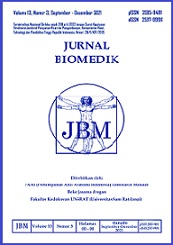TYPES OF LESIONS AND THE INCIDENCE OF TOTAL OCCLUSION OF CORONARY ARTERY IN METABOLIC SYNDROME
DOI:
https://doi.org/10.35790/jbm.5.2.2013.2591Abstract
Abstrak: Sindroma metabolik merupakan gabungan kelainan-kelainan metabolik, termasuk obesitas sentral, penurunan high density lipoprotein, peningkatan trigliserida, peningkatan tekanan darah, dan hiperglikemia, yang berpotensi meningkatkan risiko aterosklerosis. ACC/AHA membuat klasifikasi lesi koroner (tipe A, B, dan C) untuk memrediksi tingkat keberhasilan dan risiko tindakan intervensi. Beberapa studi lain menunjukkan derajat keparahan dari jenis lesi koroner terkait dengan outcome jangka panjang. Penelitian ini bertujuan untuk mengetahui perbedaan jenis lesi dan insidensi dari lesi oklusi total pada pasien dengan sindrom metabolik. Sejumlah 43 pasien berturut-turut dengan atau tanpa sindrom metabolik yang menjalani angiografi koroner di Rumah Sakit Awal Bros sejak tanggal 1 Jan sampai 15 Februari 2013 dimasukkan sebagai sampel penelitian. Pasien dikategorikan sebagai penyandang sindrom metabolik bila memenuhi definisi NCEP ATP III untuk populasi Asia. Hasil penelitian memperlihatkan bahwa dari 43 pasien, 25 (58%) didiagnosis sebagai sindrom metabolik. Pada kelompok sindrom metabolik ditemukan jenis lesi koroner tipe A 0%, tipe B 40%, dan tipe C 60%, dengan insidensi oklusi total 48%. Pada kelompok bukan sindrom metabolik ditemukan bahwa lesi koroner yang tidak bermakna 16,5%, tipe A 22,5%, tipe B 55,5%, dan tipe C 5,5%, dengan insidensi oklusi total 0%. Terdapat perbedaan bermakna dalam tingkat keparahan lesi koroner dan insidensi oklusi total arteri koroner di antara kedua kelompok (P < 0.001). Simpulan: Sindrom metabolik berhubungan dengan tingkat keparahan jenis lesi koroner dan peningkatan insidensi oklusi total pada arteri koroner.
Kata kunci: sindroma metabolik, tipe lesi, penyakit arteri koroner.
Â
Abstract: The constellation of metabolic abnormalities including centrally distributed obesity, decreased high-density lipoprotein, elevated triglycerides, elevated blood pressure, and hyperglycaemia are known as the metabolic syndrome. Metabolic syndrome amplifies and accelerates the risk of atherosclerosis. ACC/AHA classified coronary lesions into type A, B, and C to predict successful intervention rates and risks. Other studies show the severity of coronary type lesions associated with long-term outcomes. This study aimed to find out the difference in types of lesions and incidence of total occlusion lesions in patients with metabolic syndrome. A total 43 consecutive patients with or without metabolic syndrome who underwent coronary angiography in Awal Bros Hospital were enrolled from 1st January until 15th February 2013. Patients were categorized as having metabolic syndrome when they met the NCEP ATP III definition for Asian Population. The results showed that from 43 patients, 25 (58%) considered as having metabolic syndrome. In the metabolic syndrome group, it was found that the coronary type lesion A was 0%, B was 40%, and C was 60%, with the incidence of total occlusion being 48%. In non-metabolic syndrome, it was found that non-significant coronary lession was 16.5%, type A was 22.5%, B was 55.5%, and C was 5.5%, with the incidence of total occlusions being 0%. There was a significant difference in the severity of coronary lesions and the incidences of total occlusion in the coronary artery between the two groups (P < 0.001). Conclusion: Metabolic syndrome was associated with changes in severity of types of coronary lesions and an increased incidence of total occlusions in the coronary artery.
Keywords: metabolic syndrome, type of lesion, coronary artery disease.
Downloads
Issue
Section
License
Penyunting menerima sumbangan tulisan yang BELUM PERNAH diterbitkan dalam media lain. Naskah yang masuk dievaluasi dan disunting keseragaman format istilah dan cara penulisan sesuai dengan format penulisan yang terlampir dalam jurnal ini.
Segala isi dan permasalahan mengenai tulisan yang yang diterbitkan dalam jurnal menjadi tanggung jawab penuh dari penulis.







